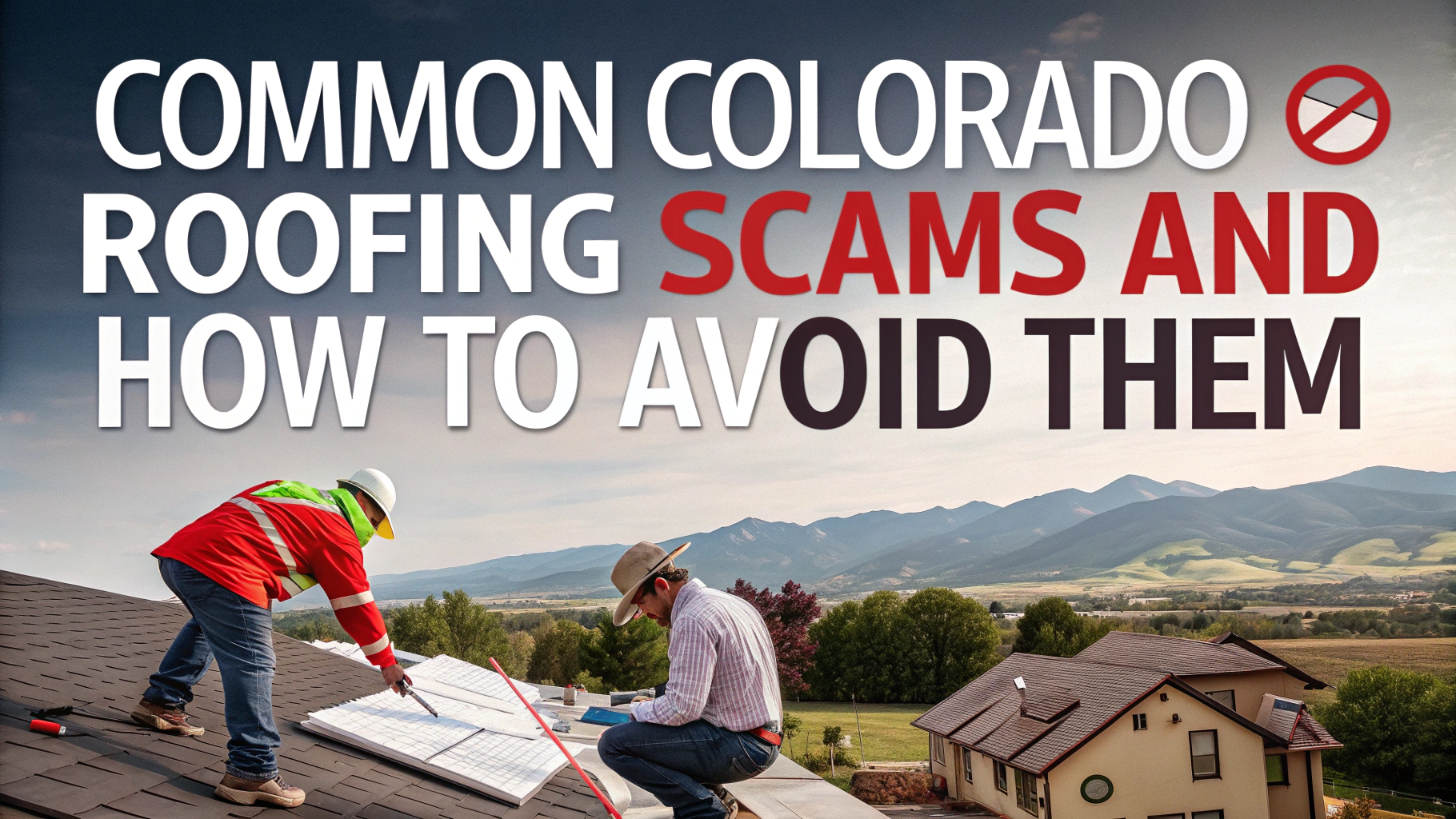Protecting your home and finances from roofing scams requires awareness and vigilance, especially in Colorado where severe weather often leads to increased fraudulent activity.
Colorado homeowners face unique challenges with hail damage, snow loads, and intense sun exposure, making them frequent targets for unethical roofing contractors.
Understanding common roofing scams and learning how to identify legitimate contractors can save thousands of dollars and prevent serious structural issues.
Storm Chasing Scams
Storm chasers typically appear immediately after severe weather events, going door-to-door to offer “free” roof inspections.
- Never sign contracts under pressure
- Verify the company’s physical address in Colorado
- Check if they have a valid Colorado roofing license
- Research their reputation through the Better Business Bureau
Low Bid Schemes
Unusually low bids often indicate substandard materials or inadequate insurance coverage.
- Get at least three written estimates
- Compare material specifications carefully
- Request proof of workers’ compensation insurance
- Verify general liability coverage
Insurance Fraud Red Flags
Some contractors offer to “waive” or “absorb” insurance deductibles, which is illegal in Colorado.
- Never accept offers to manipulate insurance claims
- Keep detailed records of all damage
- Work directly with your insurance adjuster
- Report suspicious behavior to the Colorado Division of Insurance at 303-894-7490
Material Bait and Switch
Dishonest contractors may promise premium materials but install cheaper alternatives.
- Request material specifications in writing
- Take photos of delivered materials
- Compare manufacturer warranties
- Inspect material packaging before installation
How to Verify Legitimate Contractors
| Requirement | Where to Verify |
|---|---|
| Business License | Colorado Secretary of State website |
| Insurance Coverage | Contact insurance provider directly |
| Local References | Ask for addresses of completed projects |
| BBB Rating | Visit BBB.org |
Protecting Your Investment
Contact the Colorado Roofing Association at 303-484-0549 for contractor verification and additional resources.
- Document all communications in writing
- Never pay full amount upfront
- Use secure payment methods
- Keep copies of all contracts and warranties
- Take before and after photos of all work
Legal Resources and Support
Report roofing scams to these Colorado authorities:
- Colorado Attorney General’s Office: 800-222-4444
- Local Better Business Bureau
- Colorado Department of Regulatory Agencies: 303-894-7855
- Local police department for criminal cases
Filing Insurance Claims
Understanding the proper insurance claim process helps prevent fraudulent activities and ensures maximum coverage for legitimate damage.
- Contact your insurance company before signing any contracts
- Document all damage with dated photographs
- Keep receipts for temporary repairs
- Request a detailed scope of work from adjusters
Seasonal Maintenance Tips
Regular maintenance helps identify potential issues before they become major problems and prevents unnecessary repairs.
- Schedule bi-annual roof inspections
- Clear gutters and downspouts regularly
- Check attic ventilation
- Remove snow buildup in winter
Contract Requirements
Colorado law requires specific elements in roofing contracts to protect homeowners.
- Detailed scope of work
- Material specifications
- Start and completion dates
- Payment schedule
- Cancellation rights
Safeguarding Your Home and Future
Taking proactive steps to protect your roofing investment ensures long-term security and peace of mind.
- Create a home maintenance file with all documentation
- Establish relationships with reputable contractors before emergencies
- Join neighborhood watch programs to share contractor experiences
- Stay informed about local building codes and requirements
- Consider extended warranties for additional protection
FAQs
- What are the most common roofing scams in Colorado?
Storm chasers, unnecessary repairs, disappearing down payments, insurance fraud, and high-pressure sales tactics are the most prevalent roofing scams in Colorado. - How can I verify if a Colorado roofing contractor is legitimate?
Check their license with local authorities, verify their insurance coverage, confirm their physical business address, and ensure they’re registered with the Colorado Secretary of State. - What should a legitimate roofing contract in Colorado include?
A valid contract must include scope of work, materials used, timeline, payment terms, warranty information, contractor’s license number, and cancellation rights. - Why do storm chasers target Colorado specifically?
Colorado’s frequent hail storms and severe weather make it a prime target for storm chasers who exploit homeowners needing urgent repairs. - How much of a down payment is reasonable for a Colorado roofing project?
A legitimate down payment typically shouldn’t exceed 10-25% of the total project cost, and Colorado law prohibits contractors from asking for large upfront payments. - What are the red flags of a roofing scam in Colorado?
Door-to-door solicitation after storms, extremely low bids, pressure to sign immediately, requests for full payment upfront, and no local physical address are major red flags. - How long does a reputable Colorado roofing contractor’s warranty typically last?
Workmanship warranties typically range from 2-10 years, while manufacturer warranties on materials can extend 20-50 years depending on the product. - What should I do if I’ve been victimized by a roofing scam in Colorado?
Report the incident to the Colorado Attorney General’s Office, file a complaint with the Better Business Bureau, contact local law enforcement, and consult with a construction attorney. - Are there specific seasonal periods when roofing scams are more common in Colorado?
Scams typically increase during spring and summer months, particularly after hail storms or severe weather events. - What insurance documentation should I request from a Colorado roofing contractor?
Request proof of general liability insurance and workers’ compensation coverage, with minimum coverage amounts meeting Colorado state requirements.
